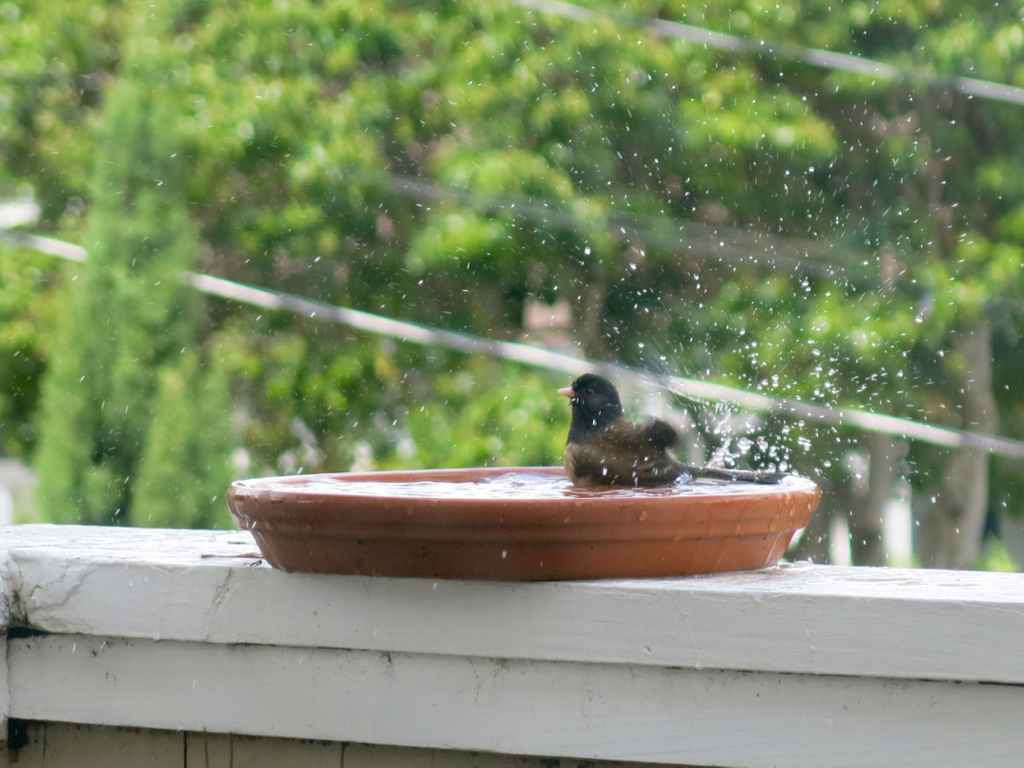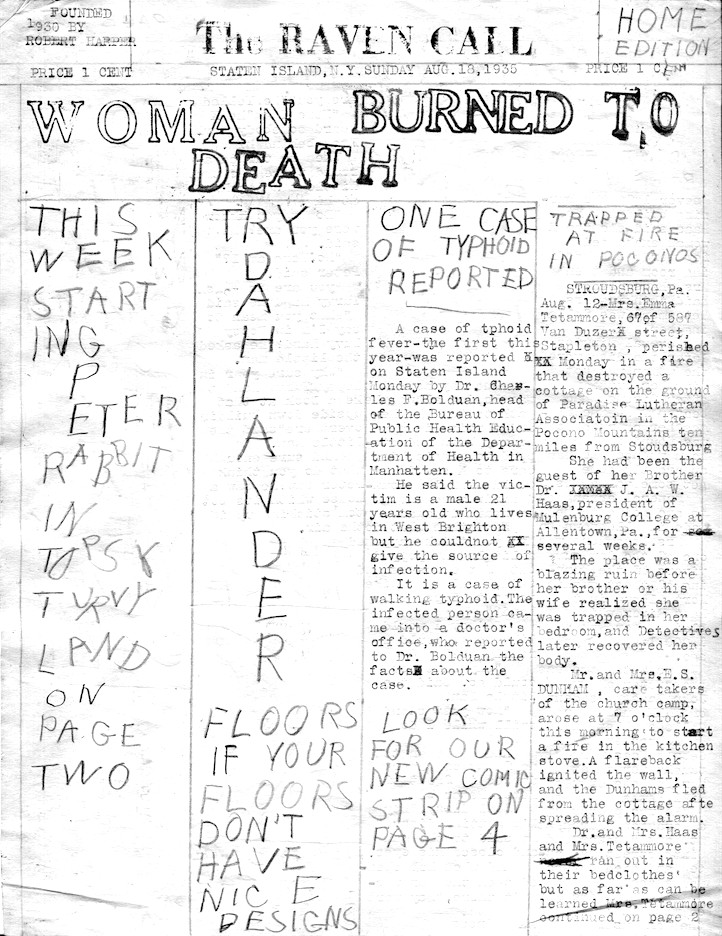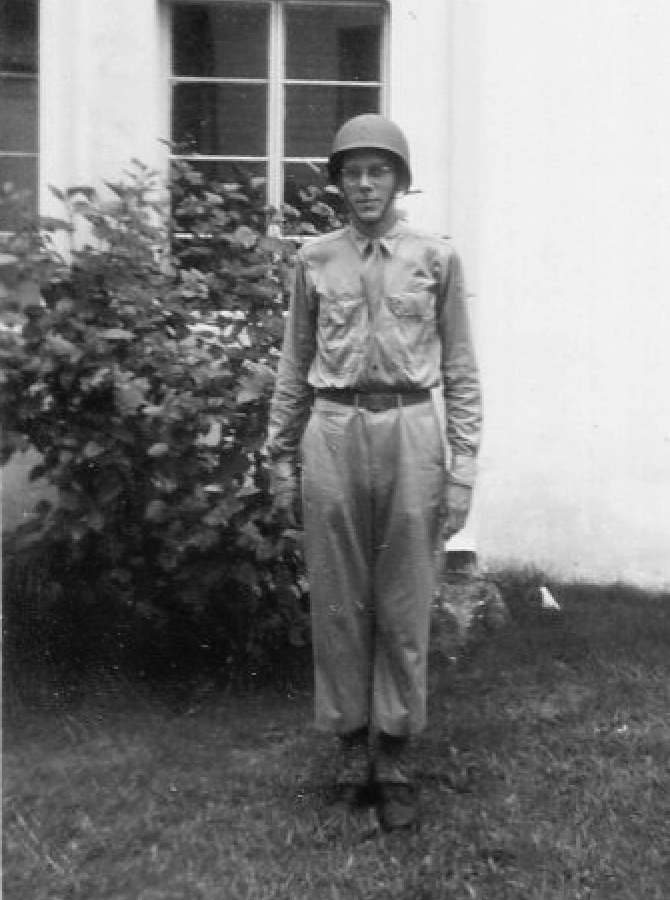We left a large clay saucer (the thing you put under a potted plant to hold excess water) out on the railing of our balcony, and filled it with water to make a bird bath. Many of the neighborhood birds have come to drink or bathe, including California Scrub Jays (Aphelocoma californica), American Crows (Corvus brachyrhynchos), Cedar Waxwings (Bombycilla cedrorum), House Finches (Carpodacus mexicanus), and Dark-eyed Juncos (Junco hyemalis). The crows and scrub-jays are too big to bathe, and all they do is drink the water — pretty boring. I most enjoy watching the juncos bathing — sometimes, one bird will be splashing around in the water while another waits impatiently for its turn to bathe. Yet even watching crows drink is better than staying glued to online “news” sources for more stories about a U.S. president who denies human-caused climate change while taking great glee in dropping the biggest bombs he can.
Category: Meditations
mOOn Over tOwns mOOn
whisper
less creature huge grO
pingness
— E. E. Cummings
The rising of the full moon pulls us away from the mundane world of traffic and pollution and politics, drawing us up into a different place: the world of Chang-O and the Rabbit in the Moon; the world of the Apollo moon landings; no, different than both these things. Something primal, something that draws our eyes up at the time of the full moon, even though any mention of the moon is trite, as trite as poems that rhyme June and Moon. I still can’t believe that I live in the northern California subrubs, where I can see the full moon rising up over both palm trees and redwood trees at the same time. I want to pretend to be bored, but I am never bored by the rising moon. It is always new, always a wonder.
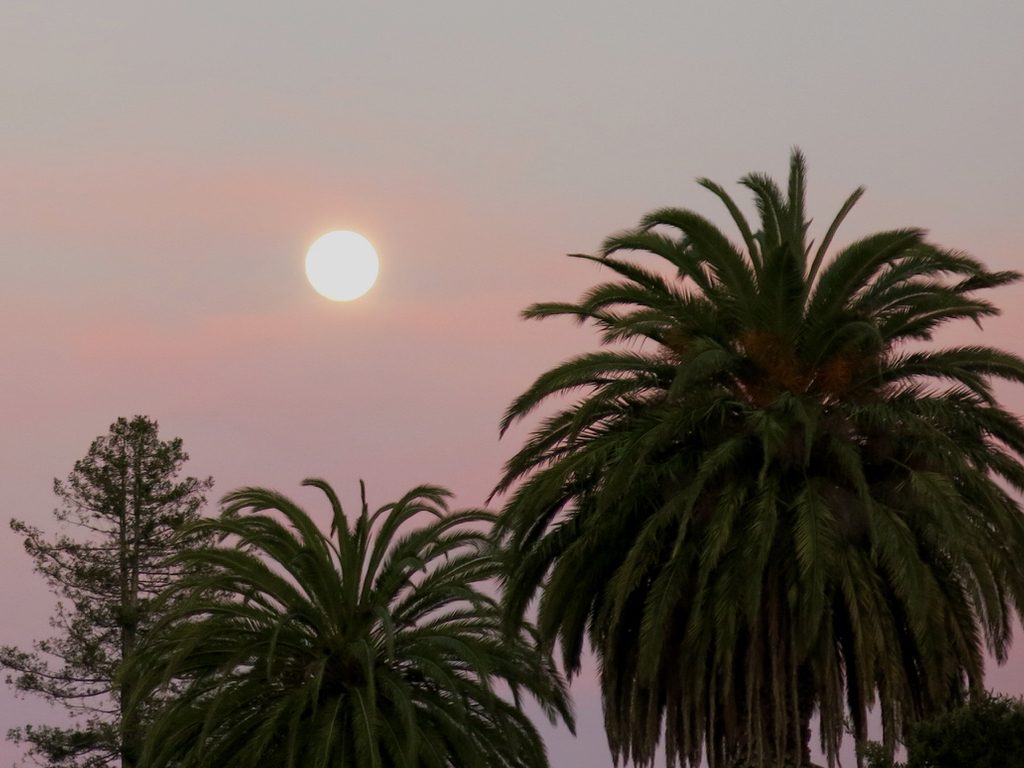
Suspirius
[My retelling of Samuel Johnson’s story of the human screech-owl for the modern age:]
We like to distinguish people by the animals we suppose they resemble. A hero is called a lion, the shy and retiring person a mouse, the owner of a payday loan company gains the title of vulture, a clever politician is as cunning as a fox. There is another kind of character found in the world, a species of being in human form which may be called the screech-owls of humankind.
These human screech-owls believe that it is their great duty to complain. They disturb the happiness of others, they lessen little comforts, they shorten the short pleasures of human life, by recalling painful episodes of the past, and by making sad predictions about the future. They crush the rising hope, dampen the kindling flame of joy, and darken the golden hours of gaiety with the hateful gloom of grief and suspicion.
If a weakness of your spirits causes you to be more sensitive to the feelings and impressions of others, if, in other words, you are apt to suffer by fascination and to catch the contagion of misery, you will find it extremely unhappy to live within the sound of a screech-owl’s voice. That screeching will fill your ears in your hours of dejection, it terrify you with fears and apprehensions which you would never have thought of yourself, it will sadden a day which you might otherwise have passed in necessary business or in recreation. That voice will burden your heart with unnecessary discontent, and it will weaken for a time that love of life which you need for any serious undertaking.
Though I have many weaknesses, as we all do, I have never been charged with an excess of superstition. When I don’t walk under a ladder, it’s not because I fear bad luck but because I don’t want the worker standing above me to drop a hammer on my head. I don’t bother to cross to the other side of the street to avoid a black cat crossing my path. I have never discovered that when the thirteenth day of the month falls on a Friday, I have any greater or lesser amount of luck. I throw chain letters in the recycle bin without a qualm. Yet for all that I am not superstitious, I have to admit that I consider it an unhappy day when I happen to be greeted in the morning by Suspirius, the human screech-owl.
I have now known Suspirius for forty-nine years and four months, and I have never yet passed an hour with him in which he has not made some attack upon my quiet. We were first acquainted when we were in school together, and in those days he would speak at length about how miserable it was to be young and have no money. Whenever we spent time together, he told me about pleasures of which I had never heard, which I couldn’t have because I hadn’t enough money, and which I never would have thought of missing, if only he hadn’t told me of them. Continue reading “Suspirius”
On March 21, 1924, in Reading, Pennsylvania, 27 year old Dorothy Fassnacht Harper gave birth to her first child. The new baby was named Daniel Robert after his father, though he was called Bobby.
Bobby’s father, Dan, had gone to college to study for the ministry, and while he was in seminary served for two years as a minister in the Evangelical Association, a German-language Methodist group. But Dan found out that ministry was not for him, so he became a newspaperman, starting as a sportswriter, and then moving into other jobs in local newspapers in Scranton, Reading, and Hazelton, Pennsylvania. Bobby’s mother, Dorothy, was the daughter of a minister in the Evangelical Association, and her father officiated at her wedding to Dan in 1921. She completed the eighth grade, then worked as a dressmaker before her marriage. Bobby’s younger brother, Lee, was born in 1928.
The Great Depression hit the year after Lee was born. Dan found it hard to find steady work. In 1932 he got a job as a rewrite man with the Staten Island Advance, Staten Island, New York, far from Pennsylvania Dutch country where he had and Dorothy had always lived. He went by himself at first, not wanting to move his family until he was sure the job was going to last. It turned out to be a good job; according to his obituary in the New York Times: “Within four years, he was promoted successively to night editor, city editor and editor.” For the rest of the Depression, and until his retirement, Dan had a steady, secure job.
Dorothy, Bobby, and Lee followed Dan to Staten Island later in 1932. When Bobby started school in Staten Island, he ran into a problem with his name. He later wrote that his “name was changed from D. Robert to Robert when the New York City school system refused to allow any student to have an initial before a name.”
While Bobby did reasonably well at school, he had a lot of outside interests, too. Both he and Lee joined his father on fishing trips, and to the end of his life he kept photographs of fishing trips and strings of fish the three of them caught. He once wrote that the point of fishing was not necessarily to catch a lot of fish: “I remember my great uncle Spencer Fassnacht saying, after four of us had fished all day without catching anything, that seeing a kingfisher catch a fish had made it a good day.”
By the time he was ten or twelve, he started a neighborhood newspaper. Although some issues of this newspaper, “The Raven Call,” didn’t have much content, there were some real stories, too. The front page headline for the August 18, 1935, edition screamed, “WOMAN BURNED TO DEATH,” and the next story arrested your attention with the headline, “ONE CASE OF TYPHOID REPORTED.”
Bobby liked to read, and I have a few of his childhood books. On the title page of one of them, “Mark Tidd in Business,” part of a juvenile series by Clarence Budington Kelland, he wrote in pencil, “THIS BOOK BELONGS TO ROBERT HARPER GRADE 6B5”; above that I’m a little surprised to see that I inscribed my own name when I was a child; I have a vague recollection that my grandmother gave me the book. Another book he gave me when I was young was “Ken Ward in the Jungle,” a book from a juvenile series by Zane Grey, and though he didn’t write his name in it he told me it was his when he was a boy. I also have his tattered copy of Ernest Thompson Seton’s “Two Little Savages,” which I took from his condo when we were getting rid of all his books just before he died. Other books of his I remember seeing when we went to visit my grandmother in Staten Island include Jules Verne’s “Journey to the Center of the Earth” and “Their Island Home.” None of these is what you’d call a serious book.
He did not remember rebelling when he was a teenager. He later wrote: “In the middle of the Depression we were thankful that my father had a job. So many of my friends had fathers who had been employed in the shipyards on Staten Island before the Depression. Now they were lucky if they occasionally found jobs as carpenters or laborers…. I seldom heard of any teenagers rebelling. I do remember two of my acquaintances who rebelled. Norman Schaeffer, whose father was a doctor, had enough money to buy an old model A Ford in which he and several others would ride around in defiance of the law (the legal driving age in NYC was 18 at that time). Perhaps rebellion is a luxury that is more likely to occur among those who are well enough off to be bored and then resent the adult world. I and most of my high school friends simply tried to keep our noses clean.”
When he got into high school, Bobby got interested in physics and electronics. He doggedly did the work required of him in school, and at home wrapped himself up in his hobbies of model railroading and radio. He was thrilled the first time he heard the sound of a distant radio station come out of a radio he had built. After graduating from Port Richmond High School, he entered Haverford College, an obscure Quaker college in southeastern Pennsylvania, in September, 1942, intending to study physics.
Two weeks into his second semester, he was drafted into the U.S. Army Air Corps. He served overseas, in the European theatre, as a ground-based radio operator mechanic in the 437th Troop Carrier Group. He was part of the Headquarters Battalion, and was stationed in England and France during the invasion of France and Germany.
He didn’t talk much about his war years, though he did say that he never saw a shot fired in anger, and that those three years in the service were almost entirely unpleasant. He was fortunate to be part of the ground crew; he told us how he’d be talking (using Morse code, not voice) with a returning bomber when suddenly their signal would disappear; they had been shot down. He told us of another time when a plane came back carrying paratroopers returning from a mission; when they got off the plane, they just kept walking past their officers, and they walked right off the base. When he told this story towards the end of his life, he said the paratroopers told their officers to fuck off.
His mother saved his letters home, and I read them all not long before his death. I read some of the letters aloud to him, while he was still capable of understanding them. One of the last conversations I had with him, before he became unable to speak, was about how he finally realized at the end of his life that he had post-traumatic stress disorder from the war. Unfortunately, his letters from the war years disappeared when we were cleaning out his condo, but I remember the tone of the letters growing darker as the war dragged on. He had some kind of romance, or maybe more than one, and I’m pretty sure he lost his virginity in England. When I was in my forties, he gave me a self-published book by a friend of his from Haverford College, which he said accurately reflected his experiences; a significant part of that book concerned the sexual experiences of the protagonist. By this point in his life, I can no longer think of him as “Bobby,” so I’ll start calling him Bob.
After the war ended in Europe, Bob was put on a ship across the Atlantic, the first leg of a trip that was supposed to take him to the Pacific theatre. While he was in transit, the atom bombs were dropped and Japan surrendered, and he was discharged from the Army on September 25, 1945. Two days later, he was back at Haverford College, having received special permission to start school at the last minute.
To be continued…
[Updated Feb. 10 to remove errors.]
In the redwoods
On Thursday, I was at a meeting in Camp Meeker, California, in the redwoods. In the morning, I walked out the door just in time to look out at the top of the fog bank in the valley below.
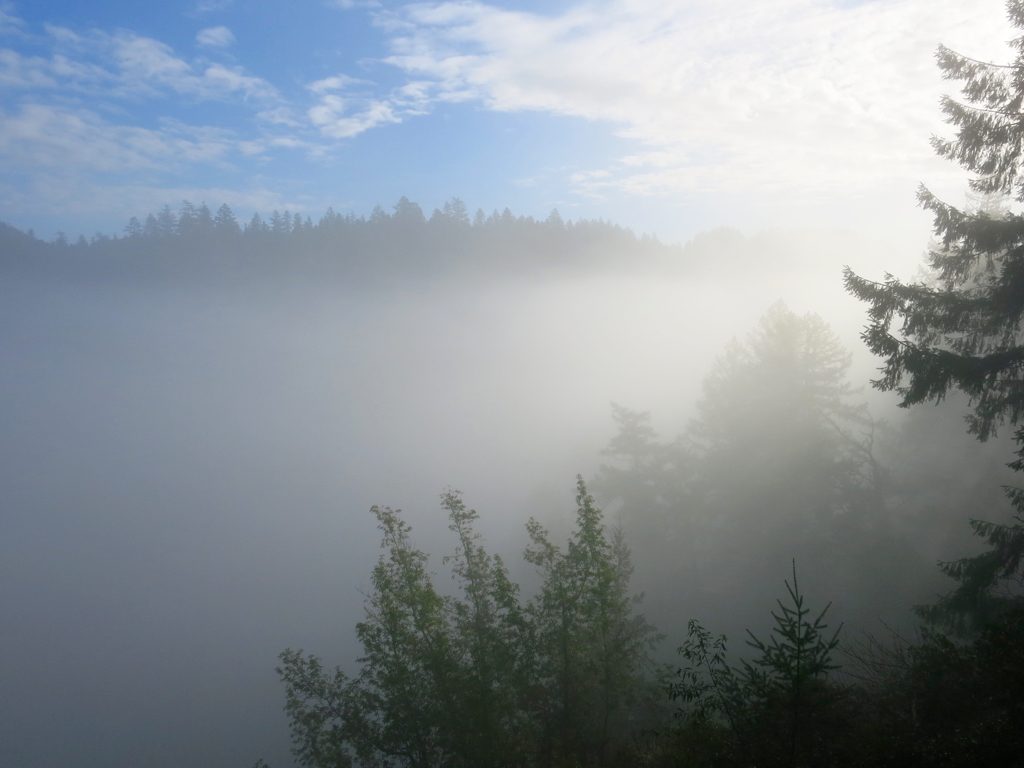
As in a traditional Chinese landscape painting, by anyone from Wang Wei down to the Ming dynasty, you could tell how far away something was by how much it faded into the mist; and then above the mist you could see a distant hilltop covered with trees. I imposed a kind of Western-style perspective into the photograph by finding lines — in trees, in the horizon, in the clouds — that seem to lead to a vanishing point about where the sun is trying to break through the clouds. There was no perspectival vanishing point in the actual landscape: just mist and trees and abrupt hills and valleys. But so it is that we use our familiar conceptual schemas to experience the world, even when they don’t really fit.
Noted, with minimal comment
“In the Enlightenment, ‘natural law’ functioned as a radical critique of the existing order. … [N]atural law’s most salient exponent is, without doubt, late nineteenth-century Social Darwinism. The Social Darwinists co-opted Charles Darwin’s theories of biological evolution — specifically, the idea that in nature there is an ongoing amoral struggle, in which the survivor is the most fit in a specific place and a specific time, or, simply, the most powerful. For the Darwinists this was an indisputable fact. Furthermore, the cruelty of the victory guarantees the development of the species and its advancement. Social Darwinism is the application of a biological principle to the sphere of human affairs: what is perceived as a fact of life in the natural world is deemed applicable to human affairs. The two most obvious examples of Social Darwinist thinking are Nazi ideology on the one hand, and a certain idealization of capitalist competition with its relentless preoccupation with egoistic self-fulfillment, on the other. In other words, the theoretical laws of the biological world are hereby transformed into normative social doctrines. Natural law came to be understood as amoral.” — Shalom Rosenberg, “Concepts of Torah and Nature in Jewish Thought,” Judaism and Ecology, ed. Hava Tirosh-Samuelson (Cambridge, Mass.: Center for the Study of World Religions, Harvard Divinity School, 2002), pp. 190-192.
Yes indeed. To hell with the homeless, the poor, and the unemployed. It may seem cruel to let them starve to death, but it’s just nature’s way of weeding out the unfit — so sayeth many of our politicians today, in their twisted misunderstanding of biological theory.
Progress report
Seven months after my dad’s death, I can tell you (as if you didn’t already know) is that grief takes time. At the rational, conscious level, I often feel as though I’m moving at the same pace that I always do. But then I look around, and see all the housework that isn’t getting done, and all the little things at work that aren’t getting done, and I have to acknowledge that I’m not getting as much done.
I think, though, that when it comes to hands-on work, like housework and growing things and making things, I’ve lost very little efficiency; whereas the less embodied tasks, things like checking email and project management and the like, are taking lots more time. I said I think this is so, but I already know that while I’m grieving my rational self isn’t good at thinking about and judging myself.
I am now bored by grieving. Last week, I was so bored I climbed up on a stepladder and cleaned the cobwebs in the high peaks of the kitchen ceiling, something that I haven’t done for two years. Yesterday, I was so bored I cleaned out all of my tool boxes, made a tool roll for chisels and one for files, and a toolbox for handsaws; in the process I found things I thought I has lost: a chuck key for an old drill, a whet stone, a pop-rivet gun.
But I find I have less tolerance for sitting at a computer. Screens narrow your field of view, and disconnect you from the real world of manipulable things. And, as we are now learning by watching the mental health of teenagers, computers induce and increase anxiety, often to pathological levels; grief is enough; I don’t need to add anxiety.
In short, I’m about where I’d expect to be: grief, so they say, bottoms out in half a year, and I do feel as though I’m on the upward trend.
Persimmon
Ryokan, high in the tree,
plucked the bright persimmons
tasting them to test their ripeness.
But then he ate them all himself,
forgetting the small boy
who waited on the ground.
I bought my persimmons
in the bright supermarket;
one was soft, but was it quite ripe?
I plunged a spoon into it, and
it was almost perfect,
so I shared it with you.
(The story of Ryokan and the persimmons appears in the introduction to John Stevens, One Robe One Bowl: The Zen Poetry of Ryokan [Shambala: 2006/1977], but without any attribution.)
Before going to sleep
My Unitarian parents had my older sister and me say prayers before bed when we were children, more as a cultural practice than a spiritual practice; in the middle of the twentieth century in the United States, it was a cultural norm to have your children say their prayers before bed. But I have only the vaguest memory of this, so I suspect we only did it a handful of times, probably when we were quite young. I don’t remember my younger sister ever saying bedtime prayers, though maybe they made her do it once or twice, too.
I like the idea of some kind of reflective practice at the end of the day, though I have no interest in reciting “Now I lay me down to sleep.” Pythagoras (c. 570 – c. 495 BC), in one of his “Golden Verses,” outlined a different daily practice, which I think would make a good alternative:
“Never suffer sleep to close your eyes after going to bed, till you have examined, by your reason, all your actions of the day. ‘Wherein have I done amiss? what have I done? what have I omitted that I ought to have done?’ If in this examination you find that you have done amiss, reprimand yourself severely for it; and if you have done any good, rejoice.” (1)
Or, as “John Shadow,” an eighteenth century English writer, described the practice: “It was a good piece of advice which Pythagoras gave to his scholars, that every night before they slept they should examine what they had been doing that day, and so discover what actions were worthy of pursuit tomorrow, and what little vices were to be prevented from slipping unawares into a habit.” John Shadow then goes on to suggest that when we get up in the morning, we should examine our dreams to learn even more about ourselves, because in our dreams we imagine circumstances which give us imaginary opportunities of pursuing our good or bad inclinations “to the utmost,” thus revealing to us our true temperament. (2)
I make every effort to forget my dreams, considering them leftovers and trash that should be emptied out, not picked through. And as for Pythagoras’s advice, I’m not sure I want to spend the moments before falling asleep reviewing all the stupid things I’ve done that day, and then reprimanding myself; that seems like a sure recipe for insomnia. Either that, or I’d fall asleep while still going over the long list of things I’d done wrong that day, which seems likely to lead to nightmares.
There is also the Confucian spiritual practice of “quiet sitting,” developed by the Neo-Confucian school about a thousand years ago. The Confucians would practice quiet-sitting in the middle of the day: Sitting quietly in a chair with the back straight and hands on your knees, they would examine the “mind-heart” (unlike us Westerners, the Confucians considered mind and heart to be one). Examining the mind-heart is not easy; there is ancient Chinese metaphor that equates the mind-heart with a lively monkey which prefers to run around and finds it difficult to sit still. The Confucians taught that when you do quiet-sitting, the goal is to get the lively monkey of the mind-heart to sit quietly so you are able to reflect on your “ren,” your humaneness; that is, you reflect on how human you are. (Quiet-sitting technique may sound like Buddhist meditation, though the Neo-Confucians would say it was different: Buddhists sat quietly to achieve an independent mental state, Neo-Confucians sat quietly to better understand themselves, so that they could act ethically and fit into the social order.) (3)
The Neo-Confucians who developed quite-sitting had servants, so they could devote a couple of hours in the middle of each day to this practice; they didn’t have to go off to work. The middle of the day might be the best time to engage in this practice: less chance of falling asleep (especially if you do it before lunch), and no chance of developing insomnia or nightmares. This may be an advantage of bedtime prayers: when you pray, you can repeat verbal formulae — “Now I lay me down to sleep”; “Our God who is in heaven”; etc. — and this repetition requires less concentration and less self-discipline, and is more conducive to comforting sleep.
I am not going to return to “Now I lay me,” nor am I fully convinced by either the Pythagoreans or the Neo-Confucians. But some kind of self-reflection each day, something to move me towards greater humaneness, would be very valuable indeed.
To be continued….
Notes:
(1) The translation is from The Commentary of Hierocles upon the Golden Verses of Pythagoras, rev. ed. (Glasgow: Robert Urie, 1756), p. 140; which was based on the trans. into French by Andre Dacier, as trans. from French into English (London: Jacob Tonson, 1707), see p. 304.
(2) From the August 27, 1714, issue of The Spectator; attributed to John Byrom. The Spectator vol. V, ed. Donald F. Bond (Clarendon Press: Oxford, 1965), p. 4.
<3) The description of quiet-sitting is adapted from John H. and Evelyn Nagai Berthrong, Confucianism: A Short Introduction (Oxford: Oneworld, 2000), p. 34.
Yet another definition of “postchristian”
From Geez magazine, a Canadian periodical aimed at leftist and progressive Christian young adults:
“Postchristian, in my view, describes someone who is inspired by the life of Jesus — a prophetic challenge to the rich and powerful, sacrificial love of neighbour and enemy, communal ethic that demotes private property, and compassion upon all people (oh wait, that’s the Buddha, but I think they all blend together at some mystical point before language has a chance to separate us) — but sees the Christendom thing — institutional, bureaucratic, patriarchal, capitalistic, and with professional clergy approved by degree-granting institutions with huge foundations from the most problematic corporations in our midst — as straying from the path.”
I can quibble with some aspects of this definition. Most importantly, for me Christendom has little to do with the minor bureaucracies of individual denominations, and a whole lot to do with how religion has been co-opted and used by corporations and nations to oppress and dominate others. And I feel my definition of Christendom is important because corporations are now increasingly turning to the co-optation of Buddhism to control their workers through mindfulness training meant to anesthetize and pacify and turn human beings into meat robots; a process which provides an additional benefit in marketing, because right now Buddhism is seen as hip and cool and helps to market products and strengthen consumer capitalism.
But aside from a few minor quibbles,— yeah. Challenging the rich and powerful. Sacrificial love and communal ethic (which are actually more challenges to the rich and powerful). I can work with that.

